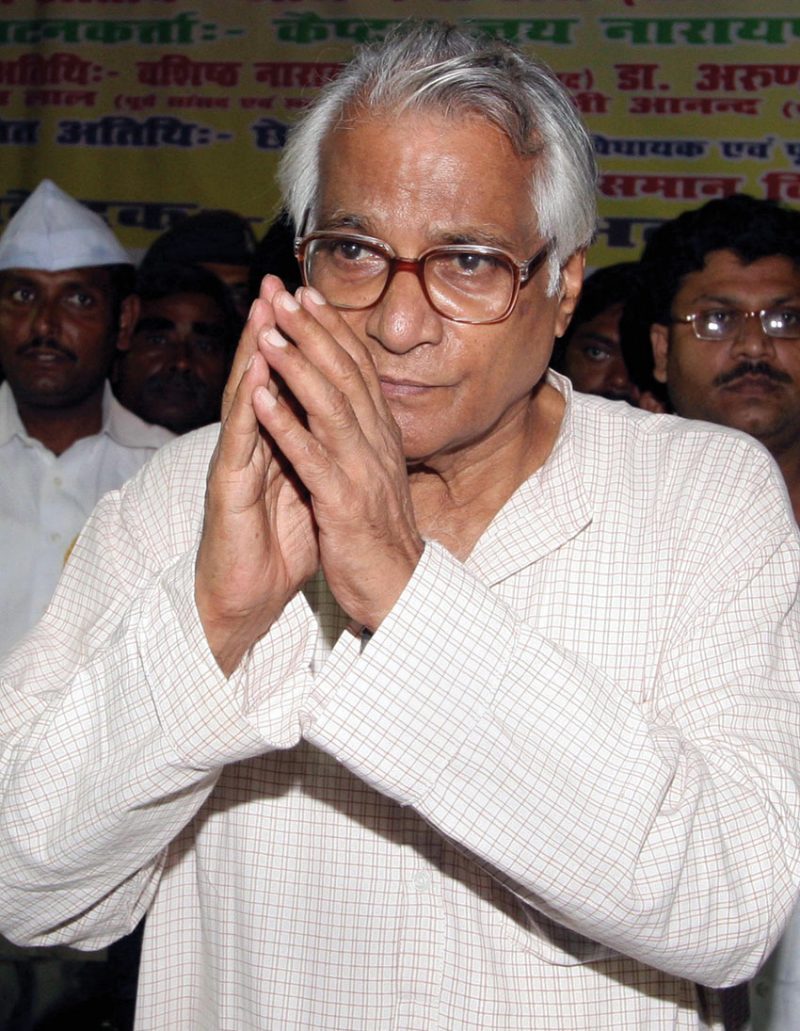Legendary Firebrand Leader George Fernandes Passes Away
File photo of former Indian Defense Minister George Fernandes greets his supporters at the historical Srikrishna Memorial Hall in Patna, Bihar, Oct. 11, 2006. (AFP/Getty Images)
The much-admired firebrand leader, trade unionist, former journalist, veteran Indian Parliamentarian, and ex-Union Minister of Railways, Industry, Communications, and Defense, George Matthew Fernandes is no more. Priyanka Bhardwaj writes a tribute.
Born in Manguluru, June 3, 1930, the 88-year-old leader lost his life’s battle to a recent bout of swine flu.
A polyglot who had mastered Tulu, Konkani, English, Hindi, Kannada, Marathi, Tamil, Urdu, Malayalam and Latin languages, his memory had been wiped off by Alzheimer’s disease in the last leg of life, but his simplicity, honesty and staunch fearlessness in fighting corruption and injustice and never submitting to any pressures will ensure that his name eternally remains etched on the sands of time.
Raised as a Mangalorean Roman Catholic, the free-thinking George ran away from home to Mumbai, to escape the seminary that his father made his eldest son, ‘Gerry’ join.
Never must he have imagined what destiny had in store for him as he did odd jobs, slept on pavements and beaches, and rallied workers to form various trade unions and movements, moved by their exploitation.
The respect and love of hotel employees for him can be gauged from the fact that they sheltered and fed him throughout his early penniless days.
It was his chance meeting with the financial capital’s legendary trade union leader D’Mello that fired him up to form a union of textile mill workers and defeat the reigning Congress leader S.K. Patil from South Bombay in the 1967 General Elections, with which he entered the national hall of political fame.
In 1974, his three-week-long, nationwide railway strike in 1974, and Jai Prakash Narayan’s Bhu Andolan(agrarian movement), separately, rattled the reigning Prime Minister, Indira Gandhi to the extent of her imposing the Emergency in 1975.
Motivated to defend civil rights, this fearless crusader took to the path of Bhagat Singh and Chadrashekhar Azad, calling Indira a “cogential liar,” and moved his political base to the eastern state of Bihar even as the government used its might to frame him up in the Baroda Dynamite Case and arrested him from his hideout.
It is said that for quite some time George hoodwinked authorities disguised as ‘dhoti’ (lower garment) clad and ‘gamchha’ (cotton towel) carrying Bihari worker or a turbaned Sikh.
His captivity made him a sensation and ensured him the 1977 victory from Muzaffarpur constituency by a world-record margin of 300,000 votes.
Exonerated of all charges and tasked with the portfolio of the Ministry of Industry in the newly formed non-Congress Janata Government of Morarji Desai, he used this opportunity to throw out multinational giants, Coca-Cola and IBM, from India, for blatantly violating investment protocols.
But before the end of the full-term cracks appeared in the coalition regime, and the then Deputy Prime Minister, Charan Singh, was enticed by the Congress to break away with his 64 members of erstwhile Lok Dal party, in connivance with Raj Narain, while the Bharatiya Jan Sangh, of its own, too followed suit to form the Bharatiya Janata Party (BJP).
However, as events unfolded during the confidence motion in Lok Sabha, the Congress backed out of its promise of support to Charan Singh, and the Parliament stood dissolved and the eventual re-elections again brought back Indira Gandhi at the helm.
The only loss that he ever encountered in his lifetime was in the 1984 polls, from his beloved state of Karnataka, a regret he would always reminisce.
As the Railways Minister in V.P. Singh’s government in 1989, George used the opportunity to give the necessary much required impetus to the Konkan Railways, and later under his tenure as the Minister of Defense (1998-199 & 1999-2000) in Atal Bihari Vajpayee-led National Democratic Alliance (NDA) government, of which he was also the convener, the country carried out nuclear tests at Pokhran in 1998, and fought the Kargil War with Pakistan in May-July 1999.
Immediately thereafter, his name started cropping up in several controversies and the downslide of his political influence began.
His last stint was as Rajya Sabha Member of Parliament between August 2009 and July 2010 and in his nine-time electoral record to the Lok Sabha, he remained a humble ordinary soul.
Countless people recall astonishing facets of his life, his crumpled kurta pyjamas, leather slippers, non-branded glasses, disheveled hair, his eschewing the security paraphernalia, living at Bungalow No.3 on Krishna Menon Bungalow that had no gates, while served as the Defense Minister, and walking down to the Parliament from his official residence.
About a decade and a half back he had opened up on his wish to be re-born as a Vietnamese, a people he described as the most disciplined, committed, determined, unyielding to the invasive powers that be—the US, France and China, and overcoming their devastation with zeal, innovation and forward thinking to even overtake an Asian power like India in terms of per capita income.
His self-written works, namely “What Ails the Socialists,” “Railway Strike of 1974” and “George Fernandes Speaks” best encapsulate his thoughts and ideas.
Acknowledging and mourning the huge void George’s passing away has left, leaders from all cross sections of politics, industry and society continue to pour in.
He leaves behind a New York based investment banker son, Sean Fernandes, from his marriage to Leila Kabir, the daughter of Union Minister Humayun Kabir, from whom he had separated in the 1980s and sought the companionship of Jaya Jaitley, former President of Samata Party, founded by George himself.
Some years back an unpleasant dimension had unfolded when Sean and his mother returned to nurse him in the last years of his life, and waged a protracted battle with Jaitley and George’s brothers, Michael, Richard and Alexander, alleging them to be usurping the socialist leader’s property and legacy.


